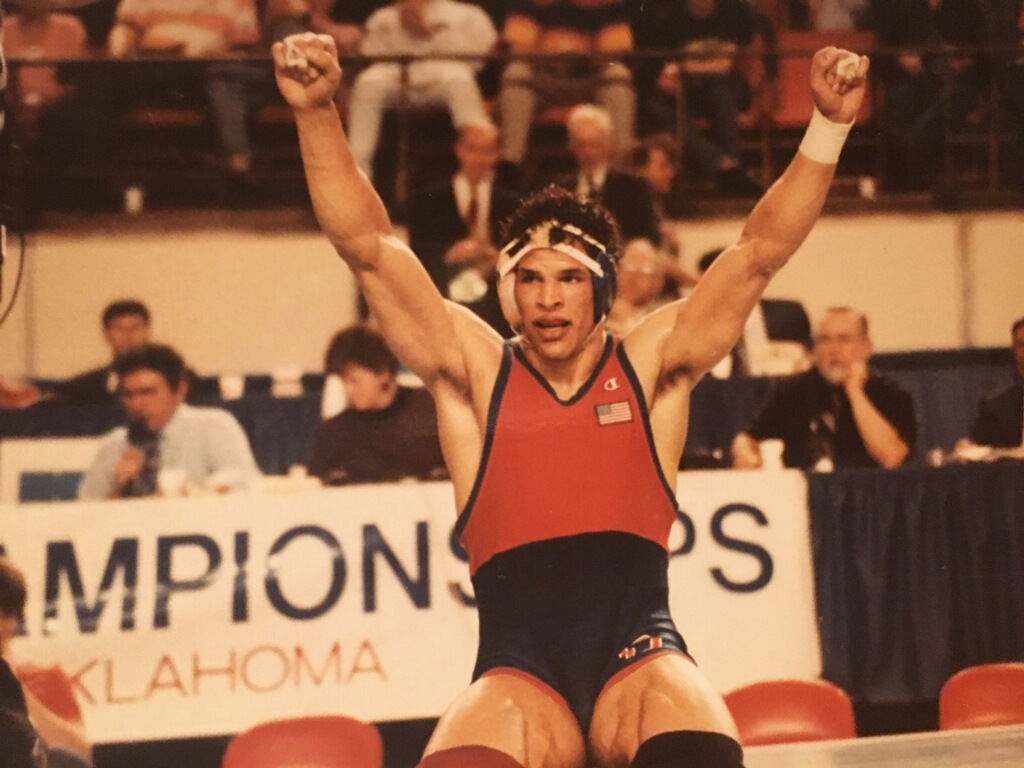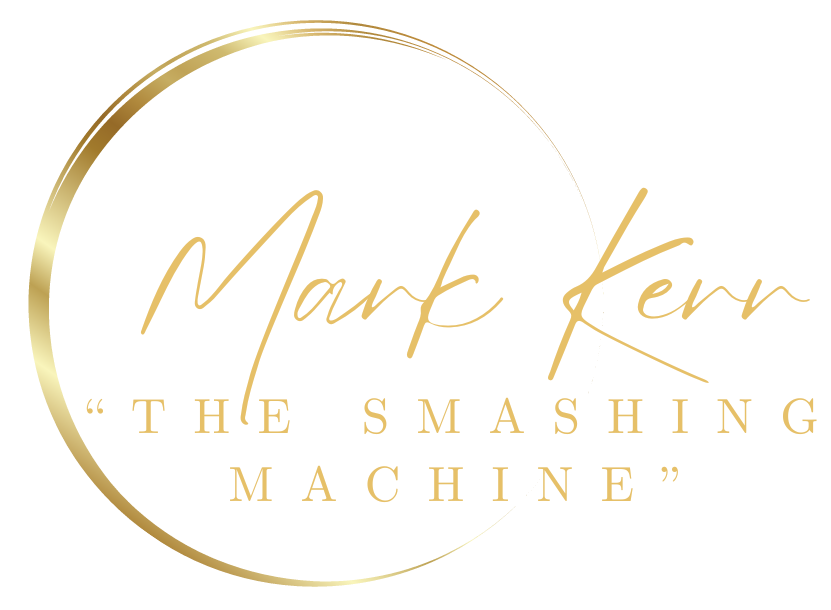
Mark Kerr is a retired American mixed martial artist and former professional wrestler. He was born on December 21, 1968, in Toledo, Ohio. Kerr gained prominence in the late 1990s as a dominant force in the sport of mixed martial arts (MMA).
In the early years of his career, Kerr achieved success in the PRIDE Fighting Championships, a prominent MMA organization based in Japan. Known for his powerful striking and grappling skills, Kerr became a two-time winner of the PRIDE Grand Prix tournament in 1997 and 2000. His performances earned him the nickname “The Smashing Machine.”
Mark Kerr also competed in the Ultimate Fighting Championship (UFC), where he faced tough opponents and achieved notable victories. However, his career faced challenges, and he struggled with personal issues, including substance abuse problems. These struggles were documented in the HBO documentary titled “The Smashing Machine: The Life and Times of Mark Kerr,” which provided insight into his life inside and outside the ring.
“The Smashing Machine” offers a poignant and unflinching look at the triumphs and tribulations of Mark Kerr, shedding light on the often harsh realities of a career in professional fighting and the personal demons that fighters may confront. The documentary’s critical acclaim stems from its honest portrayal of the complexities inherent in the world of early no holds barred fighting and the toll it takes on those involved.
Subscribe For Updates
NEWS & UPCOMING EVENTS
Interesting Facts
Mark Kerr was born on December 21, 1968, in Toledo, Ohio. His journey into combat sports began with a strong foundation in wrestling. Kerr attended Syracuse University, where he competed as a heavyweight wrestler. His time at Syracuse not only honed his wrestling skills but also forged the mental resilience that would later characterize his fighting career.
- Entry into MMA: Kerr transitioned to mixed martial arts (MMA) in the mid-1990s, a period when the sport was still finding its identity. With his formidable wrestling background, Kerr quickly made a name for himself in the MMA world. His powerful striking and grappling abilities were particularly showcased in the PRIDE Grand Prix tournaments held in Japan.
- PRIDE Success and Grand Prix Victories: Mark Kerr’s success in the PRIDE Grand Prix tournaments was a defining chapter in his career. Winning the tournament in 1997 and then again in 2000 solidified his status as one of the most dominant heavyweights in the sport. These victories came at a time when PRIDE was a major force in global MMA, attracting top fighters from around the world.
- Challenges and Personal Struggles: Despite his achievements in the ring, Mark Kerr faced personal challenges outside of it. The documentary “The Smashing Machine: The Life and Times of Mark Kerr” shed light on his struggles with substance abuse and the toll that the demanding nature of professional fighting took on his personal life.
- UFC Stints and Later Career: Kerr also competed in the Ultimate Fighting Championship (UFC), adding to his legacy as a versatile fighter. While he achieved success, the latter part of his career saw a decline in performance. Injuries and personal issues contributed to this downturn, marking a challenging phase in Kerr’s journey.
- Legacy and Impact: Mark Kerr’s legacy extends beyond his individual achievements. He played a role in popularizing MMA during its formative years, contributing to the sport’s growth and eventual mainstream acceptance. His story serves as a reminder of the physical and emotional toll that professional fighting can have on individuals.
- Post-Retirement: Following his retirement from active competition, Mark Kerr faced the ongoing challenges of transitioning to life outside the cage. Details about his post-fighting endeavors, personal growth, and any advocacy work he may have been involved in would likely provide further insight into this phase of his life.
Mark Kerr’s rise to prominence occurred during the late 1990s, a period often considered the “Golden Age” of mixed martial arts (MMA). This era saw the sport evolve from its early days of limited rules and niche audiences to a more organized and widely recognized form of combat sports.
- MMA in the late 1990s was a new and controversial phenomenon, with various organizations competing for dominance.
- PRIDE Fighting Championships in Japan emerged as a major player during this period, providing a platform for fighters like Mark Kerr to showcase their skills.
- Kerr participated in the prestigious PRIDE Grand Prix in the late 1990s, winning the tournament in 1997 and 2000 and establishing himself as a top heavyweight fighter.
- Despite his success in Japan, Kerr also ventured into the UFC, the premier MMA organization in the United States, contributing to the sport’s global growth.
- Kerr’s story reflects the challenges and triumphs of a fighter navigating the complexities of an evolving and sometimes controversial sport.
- The documentary “The Smashing Machine: The Life and Times of Mark Kerr,” released in 2002, offered an intimate look into Kerr’s life, shedding light on personal struggles faced by fighters during this era.
- Kerr’s journey intersects with a pivotal moment in MMA history, leaving a lasting impact on the sport’s evolution into mainstream entertainment.
“The Smashing Machine: The Life and Times of Extreme Fighter Mark Kerr” is a documentary that provides a candid and often raw portrayal of Mark Kerr’s life, both inside and outside the world of mixed martial arts (MMA). Directed by John Hyams and released in 2002, the film explores Kerr’s journey through the highs of victory and the lows of personal struggles.
- Introduction to Kerr’s Physical State: The documentary begins with Kerr undergoing a medical examination, revealing the toll that his MMA career has taken on his body. This sets the stage for a narrative that encompasses both the physical and emotional aspects of his life.
- Background and Early Career: Kerr’s background as an amateur wrestler is explored, including the lack of support from his family regarding his career choice. The documentary delves into his early MMA tournaments, showcasing his victories in the World Vale Tudo Championships in São Paulo, Brazil, which earned him the nickname “The Smashing Machine.”
- Transition to PRIDE Fighting Championships: The film details Kerr’s transition from the Ultimate Fighting Championship (UFC) to the more lucrative PRIDE Fighting Championships in Japan. Kerr’s dominance in PRIDE solidifies his status as the number one heavyweight in the world.
- Personal Struggles and Addiction: Kerr’s personal life is a central focus, with the documentary highlighting his relationship with his girlfriend Dawn and the depths of his reliance on painkillers and narcotics. Graphic scenes depict Kerr’s struggles with addiction, providing a glimpse into the personal toll of his chosen profession.
- Overdose and Rehabilitation: The documentary covers Kerr’s hospitalization in October 1999 after overdosing on narcotics. Kerr’s struggle with addiction becomes more pronounced, leading to his withdrawal from a scheduled fight and his decision to check into rehab.
- Friendship with Mark Coleman: Mark Coleman, a former rival in amateur wrestling and Kerr’s mentor, plays a significant role in the documentary. The film showcases their friendship and Coleman’s support during Kerr’s challenging times.
- Relationship Strains and Redemption: The strain on Kerr’s relationship with Dawn is explored, including incidents that escalate to a point where police are called. Despite personal turmoil, Kerr prepares for the PRIDE Grand Prix 2000 Finals, seeking redemption in his MMA career.
- Fight Against Kazuyuki Fujita: Kerr’s quarterfinal fight against Kazuyuki Fujita is a focal point, with the documentary detailing the physical toll on Kerr as he faces a formidable opponent. The disappointment of defeat is palpable, both for Kerr and his supporters.
- Mark Coleman’s Victory: The film concludes with Mark Coleman’s victory in the PRIDE Grand Prix 2000 Finals, highlighting the contrast between Coleman’s success and Kerr’s challenges.
